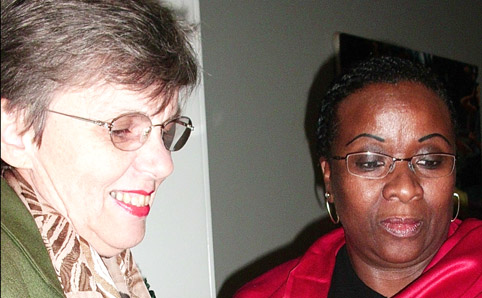Latest News Archive
Please select Category, Year, and then Month to display items
16 February 2024
|
Story ANTHONY MTHEMBU
|
Photo ROSINA MOTHIBA
 Prof Matseliso Mokhele-Makgalwa: Vice Dean; Research, Engagement and Internationalisation in the Faculty of Education at the University of the Free State (UFS).
Prof Matseliso Mokhele-Makgalwa: Vice Dean; Research, Engagement and Internationalisation in the Faculty of Education at the University of the Free State (UFS).
The Faculty of Education at the University of the Free State (UFS) proudly announces the appointment of Prof Matseliso Mokhele-Makgalwa as Vice Dean of Research, Engagement and Internationalisation, effective 1 January 2024. With a wealth of experience and a fervent dedication to academic advancement, Prof Mokhele-Makgalwa’s appointment marks a significant stride towards enhancing the faculty’s global presence and academic prowess.
Transitioning into a new role
Transitioning seamlessly from her previous role as Acting Vice Dean of Research and Postgraduate Studies, Prof Mokhele-Makgalwa perceives this new appointment as a natural progression, elevating her responsibilities to spearhead research endeavours, foster engagement, and cultivate international partnerships within the faculty. Embracing this pivotal role with enthusiasm, she underscores the importance of collaborative efforts among faculty members, securing research funding, and ensuring the quality and impact of scholarly outputs.
“I appreciate the opportunity to contribute significantly to the faculty’s research, engagement and internalisation efforts,” says Prof Mokhele-Makgalwa. “I look forward to collaborating with the faculty staff members to advance our academic initiatives on a broader scale.”
A vision of progression for the faculty
At the heart of her vision lies a commitment to realise the UFS’s Vision130, wherein Prof Mokhele-Makgalwa aims to elevate the international profile of the faculty, foster impactful research, promote engaged scholarship, and facilitate knowledge exchange on a global scale. Her strategic objectives also include positioning the faculty among the top three education schools nationally, reflecting her dedication to academic excellence and institutional advancement.
Empowering teachers: Working with head, heart and hand
2011-06-14
 |
| Prof. JJE Messerschimdt (left) is the main supervisor and Dr KE Khabanyane the co-supervisor of this study within our Faculty of Education. |
The implementation of Curriculum 2005 brought about new demands in the teaching and learning of languages. In teaching languages, it is expected of teachers to focus on the development of the basic language skills which are embedded in the first four outcomes, namely listening, speaking and reading which is coupled with viewing and writing.
Although the learning outcomes are developed as an integrated whole, each one needs special attention. According to the NCS, the third learning outcome namely "reading and viewing", is stated as follows: "The learner will be able to read and view for information and enjoyment, and respond critically to the aesthetic, cultural and emotional value in texts".
Julia Ramabenyane researches The facilitative role of Grade 1 teachers in the development of reading skills in Sesotho. Empowering teachers: Working with head, heart and hand, a workshop for Grade 1 teachers, was held on 27 and 28 May in the Winkie Direko Building on our Main Campus. The aim of the workshop was to create an opportunity for teachers to better understand their role as facilitators in the development of reading skills.
In addition to the facilitation of Mrs Ramabenyane, Prof. Hasina Ebrahim (lecturer at the School of Social Sciences and Language Education), grade 1 teachers from Lesedi and Karabelo Primary Schools, as well as the HOD of Foundation Phase and three grade 1 learners from Karabelo Primary School in Rocklands, participated in the activities.
This workshop, together with other reflective group sessions, formed part of the emancipatory action research of Julia Ramabenyane's Foundation Phase PhD studies. This PhD study is titled The facilitative role of grade 1 teachers in development of readings skills in Sesotho.